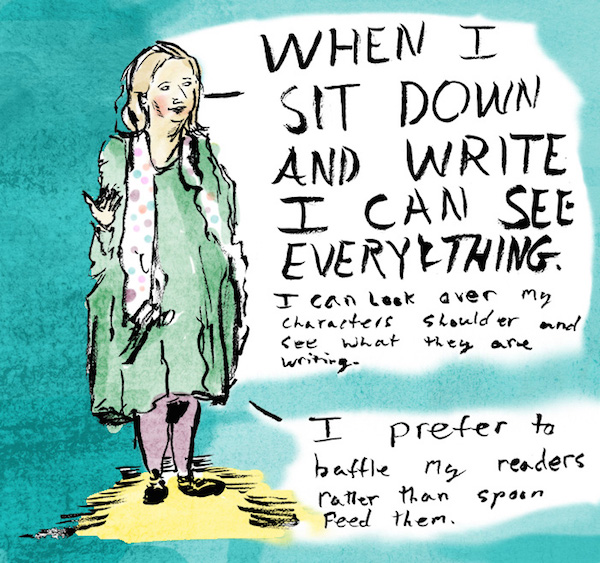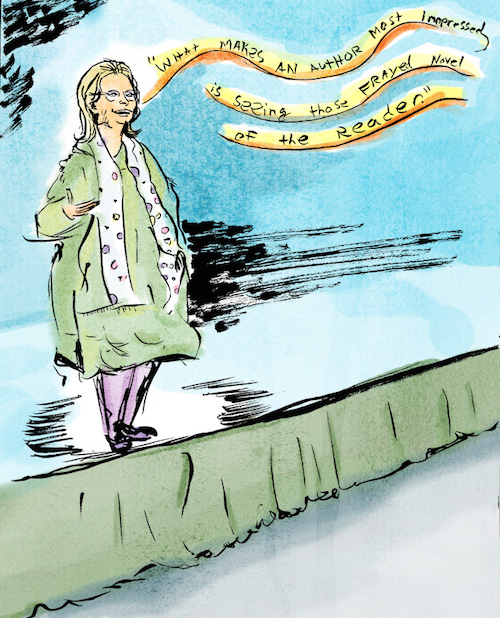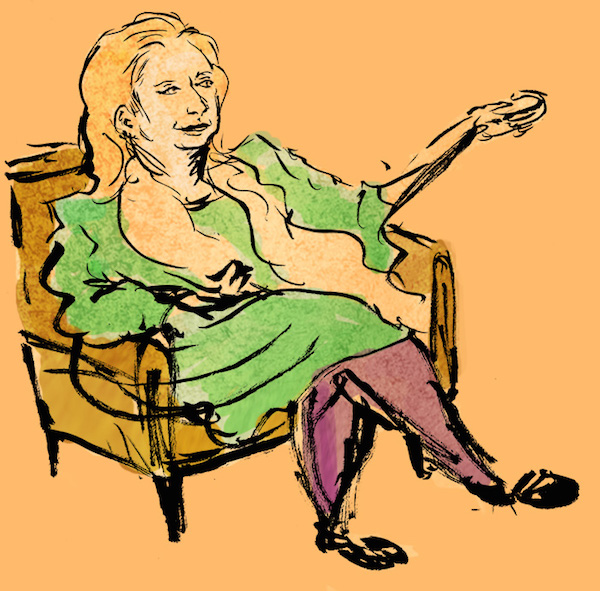A Bookish Conversation with Hilary Mantel at her #BNAuthorEvent

Hilary Mantel recently visited the Union Square Barnes & Noble in Manhattan to sign copies of Wolf Hall & Bring Up The Bodies: The Stage Adaptation, Mike Poulton’s two-part stage adaptation of Hilary Mantel’s acclaimed novels. Before the event, we had some questions for her.
Wolf Hall and Bring Up the Bodies are written completely around facts, and you stick to that methodology. Why?
I only make things up when the facts run out.
So you look in the gaps?
Exactly. But you have to make sure that whether a fact is unknown or whether you personally do not know it.
How do you do that?
That’s where the work lies, in making sure you’ve covered every possible angle and being very careful and only in the last inch saying ‘nobody knows this and nobody could ever know this.’ Because the last thing you want is to be proven wrong.
Has anyone ever called you out on anything?
No, they haven’t, to be quite honest. Sometimes I’ve found things out afterwards that I wish I’d known. But it’s seldom quite as simple as that. It’s usually that you get a little bit of knowledge after. Or sometimes you wish you had the courage of your convictions. There is an instance in Wolf Hall where my guess was better than the usually accepted version but I didn’t have the confidence right at the beginning to go with my guess and now I wish I had. And now more things have come to light since. You think that it’s the sixteenth century and nothing will come up, but things come up all the time.
Do you think that’s because of you and what you’ve done?
I think it is in a way because it makes people go looking. There’s a particular instance, Cromwell’s son, there was no known portrait of him. And yet it’s obvious he must have been painted. Now we have two, by people’s best guess. I raise the question of his age. And they were looking for someone of the wrong age. I can’t take credit for that but I was very pleased to see it in his face.
What was it like to reread A Place of Greater Safety after holding onto it. Was it hard to reread something you’d written so long ago?
Yeah, it had been sitting on a shelf for years, and it was one of the hardest things I’ve ever done. It was quite possible that it was no good at all, and if it was no good at all, I’d have to say, ‘oh well, that’s where my twenties went.’ It was a frightening time. But it was my choice because I could have kept it quiet.
You wrote it in the present tense?
Parts of it, a good part of it. Some of it was in the past tense, unlike Wolf Hall which is in the present tense. But it’s actually technically a much more complicated book. It has everything you can think of. That’s what you do with your first book, you try things out.
Are you ever tempted to stretch the facts and sneak in creative liberties?
Never. The joy is in having the facts. The better the facts, the greater the triumph when you manage to work them into drama. It’s up to you as the writer to be s0 quick on your feet that whatever obstacles those facts present, you just work around them. And I don’t mean in the sense of avoiding them.
So you have set up a challenge that most writers don’t want to work with?
I don’t know if most people would. My kind of historical fiction is different than most people’s because I like writing about real characters. I write about real people. It’s a different set of challenges faced by some historical novelists. It’s not that I think they are shirking it, I think they’re just doing something different. Historical fiction covers such a multiplicity of styles and forms. Nobody is doing it wrong, it’s just a question of, this is how I do it.
Who else does it like you? Did you learn how to do this from someone else?
No, I didn’t. People have written with real figures in the foreground but I can’t say I was apprenticed to someone. When you come across a book that’s done that well, it gives you courage. I think that’s what influence is, the influence of other writers. It’s that they inspire you by existing.
Is it true you like to write about the underdogs?
That’s fair to say. I’m not interested in people born to power. I’m interested in people who have to go out and wrestle with circumstances. A story with kings and queens can be very intriguing but it’s not really my story.
When did your fascination with Cromwell begin?
I’ve been thinking of him for all of my writing life, that is to say, I began writing in my early twenties, and I saw myself as a historical novelist. And I thought when I finished my book about the French Revolution but then I became a contemporary novelist and then I wrote other books and you come to a point where it’s very hard to break off from a certain period. It’s so time consuming. It’s easy to do when you’re unpublished and time stretches before you. But it’s not easy to stop the world and get off while you research a whole new period. Eventually I thought, “now is the time.”
Do you know who else you would write about?
I have no one in view, to be honest. I have other books in view. But not one single character.
How does your creativity come into play when writing around facts?
Every time I say, “he thought,” I’m making it up. I don’t know what he thought. It’s implicit in every line. The whole world is interpreted through Cromwell’s eyes. And I think also the creativity comes in the synthesis and the connections between one piece of knowledge and another. It’s always hard to think of examples. But you cast your net very widely. You don’t just study the politics but the whole era, its culture, and you go back a couple of hundred years because you’re thinking of what these people have read and what they see, Cromwell particularly as a young man in Italy being shaped by a very different culture. I think when a spark jumps, that is a real joy of writing historical fiction. Or when you make a connection that’s grounded in someone’s life, in their sensory experience.
What do you do to inspire your creativity to write?
Oh, I’m always in the mood to write, I’m never not. Sometimes it is true, there are spring breaks, and you’ve been exposed to too many words. And what I think you do then I don’t have to go look at something, I just have to think and walk. I’ll maybe just go and read some poetry. I’ll get some different rhythms in my head.
If you didn’t win these awards and didn’t have millions of fans, if people weren’t dying to read what you’ve written next, would you still have to write?
I would have to finish this project, yes. I think that if somebody came along and said ‘you will never be published again’ I think I’d do something else.
What would you do?
Another form of writing. Or I don’t know! Twenty years ago there were probably more choices. But I think I do know people who cease to be published and they just write their manuscripts and throw in the towel. I don’t think I’m like that. I think I’ll always find some practical use. I’ve worked in different forms. I think that if somehow I run out of steam as a novelist I’ll just skip to someone else. My problem is never lack of ideas. It’s how to prioritize which project to do next.
You walk into a big, beautiful Barnes & Noble like this one. Which section do you head to first?
I’d go to history to see what’s new. First thing you think is, “have I missed something? Has something sneaked out and been printed and I didn’t know?” And then I’d head over to psychology.
Mantel’s husband: Followed by stationary.
Oh yeah, I like to buy notebooks.

You write in a notebook?
Yeah, I do. I keep a journal as a work book.
If you were going to pick one book to be in the Hilary Mantel book club and make everyone read it, what would it be?
I’d make it a book I dearly wish I’d written called Good Behavior, by Molly Keane. I think she would have won The Booker Prize if it hadn’t been published the year of Midnight’s Children. It is the perfect novel. It might not be everyone’s taste but technically it’s indivisible. She wrote it after recovering from a stroke and lost all her speech. And she produced this wonderful thing. It’s in a different league. I can read that book again and again.
How many times have you read it?
I don’t know because I pick it up and dip into it. How does she do it, wow! It’s one of those books the the narrator doesn’t know what’s going on. And gradually the reader grasps what’s going on. There a lot of books that use that conceit but it’s so exceptionally well done. You have a real love/hate relationship with the narrator. It’s a succession of beautiful set pieces. As someone who loves the theater, I love set pieces.
What book did you like as a child or teenager?
Kidnapped. It was the first time I read a story and thought, how is this done? And it was the beginning of reading analytically, I think.
It was the book that made you a reader?
It was the book that made me a writer. Although I didn’t form an ambition to be a writer then. But something got into my head as a template. Even though I wanted to know how it was done, I’m not sure I had any answers. I don’t think I had the vocabulary. I just knew it was working well.